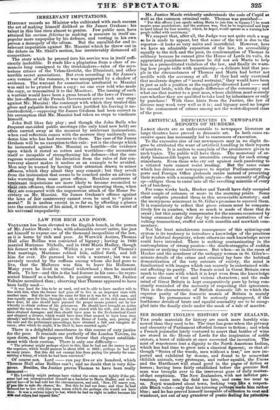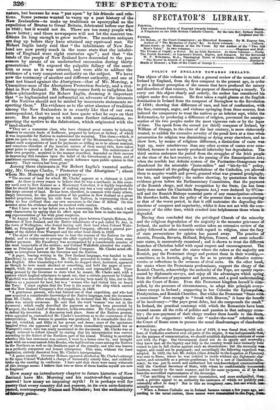SIR. ROBERT INGLIS'S HISTORY OF NEW ZEALAND. THE crude materials
for history are much more harshly.win- nowed than they used to be. The time has gone when the privacy and obscurity of Parliament afforded licence to fiction ; and when a French journalist lately ventured to assert that bottles of wine are stored in the House of Lords for the inspiration of noble, orators, a burst of ridicule at once corrected the invention. The mist of remoteness lent a dignity to the North American Indian, which has had time to grow into a classical figment; so that al- though "Stoics of the woods, men without a tear," are now im- ported and exhibited by dozens, and found to be somewhat childish animals, very grotesque, and rather squalid, the Uncle; and the Hardheart will stand good in the pages of fiction as heroes; having been fairly established before the genuine Red man was brought over to the irreverent gaze of daily matter- of-fact scepticism. The New Zealanders, with not inferior pre- tensions, came into the field too late, and came too near to us. Nayti wandered about town, looking very like a respect- able Black valet—only that his tatooing perhaps made him rather blue; and he has proved himself incapable of adhesion to coat and waistcoat, not out of any grandeur of poetic feeling for primitive nature, but because he was "put upon" by his friends and rela- tions. Some persons wanted to vamp. up a past history of the New Zealanders—to make up traditions as apocryphal as the expedition of Brutus to Great Britain, fabricated before our face in.1845 ; but it would not do. There are too many people who now better ; and those newspapers will not let the nascent tra- ditions he long enough to grow mellow. The modern antiques are dug up before they have attained any equivocal rust. Sir Robert Inglis lately said that " the inhabitants of New Zea- land are now pretty much in the same state that the inhabit- ants of England were eight centuries ago " ; and that " the lands of the people of New Zealand have descended to the pos- sessors by means of an undisturbed succession during thirty generations." We exposed the palpable fallacy of the asser- tion as soon as it was uttered, and were able to adduce the evidence of a very competent authority on the subject. We have now the testimony of another and different authority, and one at least not biased against the Aborigines—that of Mr. Moreing, a Committee-man of the Aborigines Protection Society, and a resi- dent in New Zealand. Mr. Moreing comes forth to enlighten his fellow-philanthropist Sir Robert Inglis, deeming it important that " so highminded and influential an advocate of the interests of the Natives should not be misled by inaccurate statements re- specting them." His evidence as to the utter absence of tradition among the New Zealanders is so exactly like that of our own correspondent, that we need not here quote what he says on that score. But he supplies us with some further information, re- specting the motive to the fabrication, which originated with the " land-sharks."
"They are a numerous class, who have obtained great estates by inducing Natives to execute deeds of feoffment, prepared by lawyers at Sydney, of which it was impossible for Natives to understand-the meaning. This class,—which, it gives me pain to say, includes a large number of the Missionaries,—having ob- tained such assignments of land for payments so trifling as to be almost nominal, and conscious therefore of the insecure nature of their unreal title, have taken great pains to spread a belief in the doctrine in question. The maintenance of nisi own property, acquired in the manner described, depended on their success in impressing this romance upon the belief of the Government at home, and of gentlemen exercising, like yourself, much influence upon public opinion in this country. Their success has been great." Among these claimants is Sir Robert Inglis's vaunted autho- rity, Mr. George Clarke, " Protector of the Aborigines " ; about whom Mr. Moreing tells a pretty story— "The amount of land for which Mr. Clarke appears as a claimant is 5,500 acres. As there is every reason to believe that he was a mechanic in this coun- try until sent to New Zealand as a Missionary Catechist, it is highly improbable that he should have had the means of making any but a very small payment for this large amount of land. He has been, therefore, in common with many others, deeply interested, for the preservation of his position in New Zealand as a great landed proprietor, deriving his title from the Natives, in representing them as being no less civilized than our own ancestors in the time of Alfred. On this account alone his evidence should be received with caution.
"But I have now to lay before you a fact concerning Mr. Clarke, which I will only characterize by saying that its effect upon me has been to make me regard of his with great suspicion. esi ITA'itho, formal conference took place between Captain Hobson, the Governor of New Zealand, and the Native inhabitants of a pah called Te Aro, in the town of Wellington; who denied having sold their land when Colonel Wake- field, as Principal Agent of the New Zealand Company, effected a general pur- chase of the district from Warepori and the other head chiefs in 1839. " The object of the conference was to hear the reasons of the Natives for this denial, and to endeavour to arrange the affair equitably by awarding them some Either payment. His Excellency was accompanied by a considerable number of the most respectable of the settlers; and Colonel Wakefield attended the confer- ence as Principal Agent of the New Zealand Company. Mr. Clarke acted offi- cially as intertterL,.... the Governor and the Natives. " A paper, • writing in the New Zealand language, was handed to his Excellency by one o the Natives. Mr. Clarke proceeded to render the contents into English. After translating a few words, he stopped short, hesitated, appeared as though he were much shocked at something, and held the paper at arms length, while his countenance assumed a serious and re_FmcWal look. Upon being pressed by the Governor to state what he meant, 5fr. Clarke said, with a gesture which implied reluctance to speak oat, that a certain payment by Colonel Wakefield was described in the document as having been made by him, not to the Natives as a payment for land, but to a woman who had visited him on board the Tory: I must explain that the Tory is the name of the ship which carried out the New Zealand Company's first expedition, in 1839. "A gentleman present, who had formed one of that expedition, and who had now acquired a considerable knowledge of the Native language, took the document from Mr. Clarke. After reading it through, he declared that Mr. Clarke's trans- lation was utterly erroneous. He said that the word ' woman ' was not in the document; which really described the payment as having been presented by Warepori, the head chief of that district, to his own sister. Mr. Clarke attempted to defend his invention. A discussion took place. Some of the Natives present, when appealed to, contradicted Mr. Clarke's assertions as to the correctness of his interpretation. The woman in question was produced. It is remarkable that she was old, wrinkled, and filthy in her person and dress: most lovf the tors she laughed when s appeared; and many of them immediately • her as
i
Warepors sister, who was really mentioned in the document. Mr. large was at length reduced to defend himself by stating that his interpretation was correct according to the dialect of the Northern part of the island. Wishing to ascertain whether this last statement was correct, I went to a house close by, and brought batik with me a man named John Brooks, who had lived ten years among the Natives is the Northern as well as the Southern part of the country, and who was known as a perfectly competent and honest interpreter. This man, without the least hesitation, entirely dissented from Mr. Clarke's interpretation. "A pause ensued. Governor Hobson appeared shocked at Mr. Clarke's attempt to fix upon Colonel Wakefield a charge of immorality utterly false, and suddenly broke up the meeting in confusion. I have said that there were many witnesses of_ this strange scene: I believe that two or three of them besides myself are now
in.England."
How many an introductory chapter to future histories of New Zealand have Mr. Moreing and his matter-of-fact coadjutors marred ! how many an imposing myth ! It is perhaps well for poetry that every country did not possess, in its own ante-historic period, contemporary Hitmeaand Niebiihrs ; but the authenticity of-history guns..



























 Previous page
Previous page